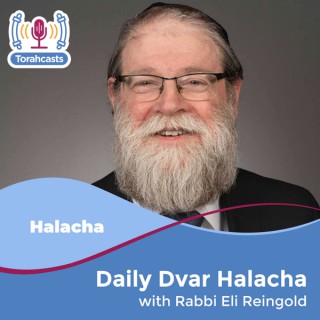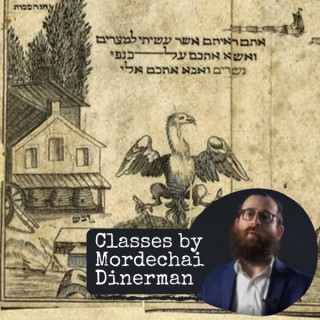Podcasts about halachah
Jewish rabbinical law
- 88PODCASTS
- 3,698EPISODES
- 14mAVG DURATION
- 5WEEKLY NEW EPISODES
- Feb 25, 2026LATEST

POPULARITY
Categories
Best podcasts about halachah
Latest news about halachah
- Halachah Where Jewish Life Actually Happens! The Yeshiva World - Jan 19, 2026
Latest podcast episodes about halachah
S0691 - Meleches Shabbos - (Klal 30 Siman 7-8) - Tzad - 29 - Using Traps - 3_ Introduction to Siman 8 - 1
S0690 - Meleches Shabbos - (Klal 30 Siman 7) - Tzad - 28 - Using Traps - 2
S0689 - Meleches Shabbos - (Klal 30 Siman 7) - Tzad - 27 - Status of Achbarim (Mice or Rats)
Terumah: The Mystery Of the Missing Metal (2026-02-17)
Archive.org version, including handout: link
S0688 - Meleches Shabbos - (Klal 30 Siman 7) - Tzad - 26 - Using Traps - 1
S6087 - Meleches Shabbos - (Klal 30 Siman 6) - Tzad - 25 - Safek Psik Reisha - 5_ Opening Ovens
S6086 - Meleches Shabbos - (Klal 30 Siman 6) - Tzad - 24 - Safek Psik Reisha - 4_ Opening Ovens
Mishpatim: Double Jeopardy and Actual Innocence (2026-02-10)
Archive.org version, including handout: link
S6085 - Meleches Shabbos - (Klal 30 Siman 6) - Tzad - 23 - Safek Psik Reisha - 3
The Rebbe rejects limiting Torah and Halachah study only to students who commit to kosher observance. Torah learning is a goal and mitzvah in itself, especially today when education depends on institutions. Study itself draws one closer to mitzvos, and Torah must not be withheld from any student. https://www.torahrecordings.com/rebbe/igroskodesh/016/005/6059
S6084 - Meleches Shabbos - (Klal 30 Siman 6) - Tzad - 22 - Safek Psik Reisha - 2
Archive.org version, including handout: link
S6083 - Meleches Shabbos - (Klal 30 Siman 6) - Tzad - 21 - Safek Psik Reisha - 1_ Introduction
S0682 - Meleches Shabbos - (Klal 30 Siman 6) - Tzad - 20 - Ain B'Mino Nitzad - 2
Archive.org version, including handout: link
S0680 - Meleches Shabbos - (Klal 30 Siman 5) - Tzad - 18 - Hunting for Sport
S0681 - Meleches Shabbos - (Klal 30 - Tzad - 19 - Hunting for Sport - 2_ Ain B'mino Nitzad - 1
S0678 - Meleches Shabbos - (Klal 30 Siman 5) - Tzad - 16 - Using an Animal to do a Melacha - 3_ Chayei Adam vs. Rambam - 2
S0679 - Meleches Shabbos - (Klal 30 Siman 5) - Tzad - 17 - Animals are Muktzeh
S0677 - Meleches Shabbos - (Klal 30 Siman 5) - Tzad - 15 - Using an Animal to do a Melacha - 2_ Chayei Adam vs. Rambam - 1
Az Yishar - Importance of RIGHT HAND in Halachah by Rabbi Benjamin Lavian
S0676 - Meleches Shabbos - (Klal 30 Siman 5) - Tzad - 14 - Using an Animal to do a Melacha
S0675 - Meleches Shabbos - (Klal 30 Siman 4) - Tzad - 13 - Asking a Non-Jew to do Tzeida
S0674 - Meleches Shabbos - (Klal 30 Siman 4) - Tzad - 12 - Using a Child for a Melacha - 3_ Misaseik
S0673 - Meleches Shabbos - (Klal 30 Siman 4) - Tzad - 11 - Using a Child for a Melacha - 2
S0672 - Meleches Shabbos - (Klal 30 Siman 4) - Tzad - 10 - Using a Child for a Melacha - 1
Archive.org version, including handout: link
S0671 - Meleches Shabbos - (Klal 30 - Tzad - 9 - Domesticated Animals - 2
Shayla of The Week #185- Severance Payment In Halachah: Requirements, Guidelines, or Recommendations?
185
S0670 - Meleches Shabbos - (Klal 30 Siman 3) - Tzad - 8 - Domesticated Animals - 1
S0669 - Meleches Shabbos - (Klal 30 Siman 2) - Tzad - 7 - Shutting the Door - 3_ Alternative Pshat in the Rashba
S0668 - Meleches Shabbos - (Klal 30 Siman 2) - Tzad - 6 - Psik Reisha in a Derabbanan - 2
S0667 - Meleches Shabbos - (Klal 30 Siman 2) - Tzad - 5 - Shutting the Door - 2_ Psik Reisha in a Derabbanan
S0666 - Meleches Shabbos - (Klal 30 Siman 2) - Tzad - 4 - Shutting the Door
Shemos-Vaeira: The Three Day Getaway (Revisited) (2026-01-13)
Archive.org version, including handout: link
S0665 - Meleches Shabbos - (Klal 30 Siman 1) - Tzad - 3 - Defining 'One Chase'
S0664 - Meleches Shabbos - (Klal 30 Siman 1) - Tzad - 2 - Three Basic Points in Tzad
S0663 - Meleches Shabbos - (Klal 30 Siman 1) - Tzad - 1 - Introduction
S0662 - Meleches Shabbos - (Klal 29 Siman 5) - Koreia - 18 - Uncut Pages and Tearing Them Open
S0661 - Meleches Shabbos - (Klal 29 Siman 5) - Koreia - 17 - Tearing Toilet Paper - 3_ A Yisrael Doing a Derabbanan
Shemos: You Are What You Eat (Or Drink) (2026-01-06)
Archive.org version, including handout: link
S0659 - Meleches Shabbos - (Klal 29 Siman 5) - Koreia - 15 - Tearing Toilet Paper
Israel's Lies EXPOSED By Rabbi Yaakov Shapiro and Historian Sam Biagetti
Antizionist Rabbi Yaakov Shapiro exposes Israel's lies, the way Zionism perverts Judaism and endangers Jews. He's then joined by historian Samuel Biagetti to debunk Candace Owens' latest lies and explain the history of Christmas and New Years. For the full discussion, please join us on Patreon at - https://www.patreon.com/posts/patreon-full-147053167 Support The Katie Halper Show and get bonus content at Patreon! https://www.patreon.com/c/thekatiehalpershow Samuel Biagetti holds a doctorate in early American history. He uses his knowledge in his antique dealership, in producing the podcast Historiansplaining, in his writings, and in giving college-level lectures. Yaakov Shapiro is an international speaker, author, and pulpit rabbi for over 30 years, now emeritus. He has attained an enviable place in the arena of anti-Zionist public intellectuals, having constructed a unique oeuvre on the ideology of Zionism and its relationship to Judaism. After graduating high school at age 16, Rabbi Shapiro dedicated himself to full-time study of religion, becoming the protégé of some of the most well-regarded rabbinic scholars in Orthodoxy. Among his areas of research are religious philosophy, analytic theology, Talmud, Halachah, and Biblical exegesis. At age 19 he published his first book, משפטי הבירורים, a collection of original expositions on rabbinic principles of tort adjudication. His other books include חלקת השדה, a commentary on Judaic laws governing land disputes (2000); צדה לדרך, a commentary on Rabbi Moshe Chaim Luzzato's exposition of God as the Necessary Being (2009); and שופריה דיעקב, a compendium of original Biblical exegeses (2017). His most recent work, The Empty Wagon: Zionism's Journey from Identity Crisis to Identity Theft (2018), a 1381-page treatise on the differences between Judaism and Zionism, is the most comprehensive work written on the subject and considered by many to be definitive. Rabbi Shapiro's videos on Zionism have been seen by millions of viewers worldwide and translated into several foreign languages. His 7-minute video on President Trump's recognition of Jerusalem as the capital of Israel has been viewed over 1.8 million times. He has lectured for live audiences of thousands. Rabbi Shapiro is a recipient of the Community Leadership Award from Agudath Israel of America; the Keser Torah Award from Yeshiva Torah Vodaath; Harbotzas Torah award from Yeshiva Bais Yisroel; Parent of the Year Award from Bnos Yisroel; and a post-rabbinical scholarship award from the Memorial Foundation for Jewish Culture. ***Please support The Katie Halper Show *** For bonus content, exclusive interviews, to support independent media & to help make this program possible, please join us on Patreon - https://www.patreon.com/thekatiehalpershow Get your Katie Halper Show Merch here! https://katiehalper.myspreadshop.com/all Follow Katie on Twitter: https://x.com/kthalps Follow Katie on Instagram: https://www.instagram.com/kthalps Follow Katie on TikTok: https://tiktok.com/@kthalps_
Dayan Refson Rambam Hilchos Malveh V'loveh Perek 6 (missing 1st Halachah)
Sunday 1 Teves
Chanukah 5786 - The Holiness of the Chanukah Menorah - Halachah and Hashkafah
This episode is a shiur given on the topic of אסור להשתמש בנר חנוכה. It discusses whether it is permitted to say Tehillim to the light of the Chanukah Menorah. It touches on the topic of how the Menorah represents the actual Menorah in the Beis Hamikdash, and what that means to us.
SmallTalk: Touro Medical Halachah Annual (with Dr. Edward Lebovics)
#416> To purchase the Touro Medical Halachah Annual Vol 1: https://mosaicapress.com/product/medical-halachah-annual/?sld=seforimchatter or https://amzn.to/4pffBuU> To purchase the Touro Medical Halachah Annual Vol 2: https://mosaicapress.com/product/medical-halachah-annual-volume-2/?sld=seforimchatter or https://amzn.to/4pIkVXs> To purchase the Touro Medical Halachah Annual Vol 3: https://mosaicapress.com/product/medical-halachah-annual-volume-3/?sld=seforimchatter or https://amzn.to/4rz7zib> For Mosiaca links use code CHATTER for 15% off > To join the SeforimChatter WhatsApp community: https://chat.whatsapp.com/DZ3C2CjUeD9AGJvXeEODtK> To join the SeforimChatter WhatsApp status: https://wa.me/message/TI343XQHHMHPN1> To support the podcast or to sponsor an episode follow this link: https://seforimchatter.com/support-seforimchatter/or email seforimchatter@gmail.com (Zelle/QP this email address)Support the show
Shayla of The Week # 176- The Wedding Day Fast of The Chassan and Kallah: The Minhag, The Meaning, and The Halachah
176
This class takes up one of the most challenging moral questions in Halachah: how far should we go to redeem captives? We'll look at how this issue unfolded in Jewish communities around the world during the fifteenth and sixteenth centuries—what actually happened, and how the poskim grappled with the Mishnah's rule against paying more than market value. In a future class, we'll revisit this topic in the modern context of Israel and its ongoing struggle against terrorism. The Hostage Dilemma: Part I
Hoshanah Rabbah Shiur - Mitzvos Tzrichos Kavanah by Sukkah and Tzitzis
This episode is the synopsis and continuation of the Halachah portion of the Shabbos Shuva Drashah - בענין מצות צריכות כוונה במצות סוכה וציצית - it largely discusses the question of the Biur Halachah whether Sukkah the rest of Yom Tov requires Kavanah or not.


























































